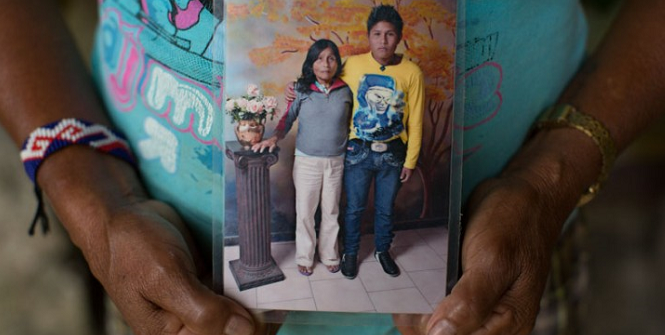Searching for Colombia’s Missing: an Ongoing Struggle

More than five decades of conflict in Colombia has had devastating effects on the civilian population and left tens of thousands of people missing. Clarifying the fate and whereabouts of those who have disappeared is of utmost importance to enable the people of Colombia to move forwards on the path to peace.
Marisol’s husband has been missing for more than four years. After being offered work in the city of Cali, the boat mechanic left his home in nearby Buenaventura and has not been seen by his family since. Without knowledge of his whereabouts or fate, Marisol lives with the anguish of uncertainty every day. ‘The pain is always there, because we haven’t been able to bury him. We still harbour the hope that he’s alive,’ she says.
Marisol’s story is all too common in Colombia, a country affected by over 50 years of conflict and armed violence. Although ongoing peace talks between two parties to the conflict, the Colombian Government and the FARC-EP (Revolutionary Armed Forces of Colombia – People’s Army), provide an opportunity for the country to envision peace as reality, the humanitarian consequences continue to rise and will potentially last for decades to come. Protracted violence affects both rural and urban areas and has brought great suffering to the civilian population. Millions of people have been internally displaced, forced to leave their homes due to fighting, extortion, destruction of private property, unexploded ordnance, sexual violence and recruitment of minors by armed forces.
The issue of the missing in Colombia is one of great humanitarian concern for the International Committee of the Red Cross (ICRC). More than 78,000 people remain missing since the outbreak of violence, leaving countless families in limbo. The number of people reported missing continues to rise – one person was reported missing every hour between January and October 2015.
Families of missing people live in a state of constant uncertainty, unable to obtain any form of closure as to whether their loved one is dead or alive. The deep wounds inflicted by disappearance last for decades and continue to undermine relationships among families and communities. In addition to enormous psychological and emotional impacts, families also often have to deal with the legal, administrative and economic difficulties that come with the disappearance of a loved one. For families like Marisol’s, the loss of their primary breadwinner can bring great financial strain.
Under the laws of war, people have the right to know what has happened to their relatives. Governments, armed forces and armed groups have an obligation to provide information in this regard, and to assist in efforts to reunite families. ICRC works to ascertain the fate of missing persons through our confidential dialogue with armed actors during and after conflict situations, and by supporting States to enact legislation to implement their international obligations and prevent more people from disappearing. We provide psychosocial and economic support to families and assist them in navigating complex legal, forensic and bureaucratic systems in the pursuit of finding a loved one. The wellbeing of these families is at the centre of our work, not just in Colombia but in a number of contexts around the world
In addition to providing support and guidance to families searching for loved ones, it is equally important that the remains of unknown individuals are recovered and identified. In Colombia, many of the bodies of the missing end up without being registered, buried in unmarked graves. This lack of registration compounds trauma for families, firstly through the loss of a loved one and secondly through their loved one being buried without the dignity and respect any deceased person deserves. Another roadblock in clarifying the fate and whereabouts of those who have disappeared is the reticence of communities to speak out when they have knowledge of the identities and circumstances of the deaths of the missing, due to fear of repercussion.
Dealing with the issue of the missing in situations where conflict is ongoing makes this task all the more complex for the ICRC. Even if the conflict finally comes to an end it will require long-term responses to enact change and alleviate the pain of those affected. Despite these challenges, ICRC is committed to implementing measures to give families at least some sense of peace and closure. In 2015 in Colombia, we recovered or received the bodies of 10 people, and over the past decade have recovered more than 90 bodies in areas with limited access. We train authorities on the issue of the missing, lead solidarity campaigns and build infrastructure in cemeteries to ensure that authorities have space to move the bodies of unidentified people until their identification is complete.
ICRC welcomes the recent signing of an agreement between the Colombian Government and the FARC-EP to take a wide range of measures to find missing people. This agreement signifies the beginning of the long road ahead to alleviate some of the suffering the conflict has caused the civilian population. It is now more vital than ever that every effort is made by all parties to the conflict, including the State, armed groups, authorities and communities, to prevent people from disappearing, to search for missing persons and to deal with the consequences of such occurrences. For the families of the tens of thousands of people still missing, the practical application of this agreement is essential in moving forward and affording them the peace they deserve.
This article is part of a series by the International Committee of the Red Cross, “Lasting wars, forgotten victims,” highlighting the serious and often overlooked humanitarian consequences of protracted armed conflicts and other situations of violence.


